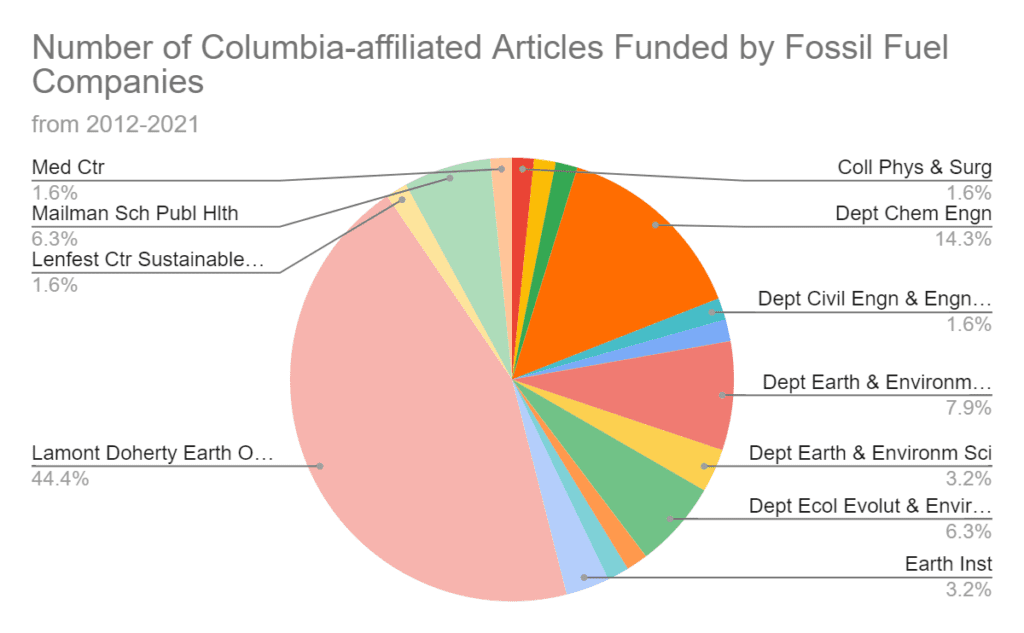From 2012 to 2021, Columbia affiliates have conducted at least 63 studies (published in academic journals) directly funded by fossil fuel companies.

Using the Web of Science (WoS) database, accessed through Columbia Libraries, we searched for research articles (published in academic journals) published by at least one Columbia affiliate and sponsored by at least one top 20 fossil fuel company1 listed in the S&P Commodity Insights Top 250 Global Energy Company Rankings. We limited our search to articles published from January 1, 2012, to December 31, 2021.

Sponsorship Bias
While industry sponsorship is not inherently problematic, allowing fossil-funded research allows industry to dictate which research questions are studied.
Industries often seek to delay regulation by using the “tobacco strategy.” Throughout the 20th century, tobacco corporations funded research at prestigious universities and medical centers to divert attention away from the carcinogenic qualities of tobacco.
Fossil fuel companies are using a similar strategy. A 1998 memo from the American Petroleum Institute describes a program for “undercutting the ‘prevailing scientific wisdom” by “funding for research contracts” for work that would introduce uncertainty about climate change. ExxonMobil funded such research for decades.
Want an example? Read the quote below from a recent journal article that examined how fossil fuel companies strategically funded university research
After learning from Exxon scientists that governments would regulate oil and gas companies to halt global warming, the French fossil fuel industry began funding studies on carbon uptake by oceans at Columbia University in the early 1990s, research that could make climate change seem less alarming.
Thacker, Paul D. “Stealing from the tobacco playbook, fossil fuel companies pour money into elite American universities.” BMJ (Clinical research ed.) vol. 378 o2095. 14 Sep. 2022, doi:10.1136/bmj.o2095
Even if fossil fuel funding doesn’t directly bias the research outcomes, it leads to “sponsorship bias.” A 2018 study published in the American Journal of Public Health concluded that “sponsorship may also influence the research agenda, namely the initial step in conducting research, during which the purpose of the research is defined, and the research questions are chosen and framed. A bias in the research agenda can affect all the subsequent stages of the research process and has the potential to affect policymaking by limiting the type of evidence that is available.”
- The companies are: Saudi Arabian Oil Co, Petróleo Brasileiro SA – Petrobras, PJSC LUKOIL, Exxon Mobil Corp, Public JSC Gazprom, TotalEnergies SE, Equinor ASA, Chevron Corp, Shell plc, ConocoPhillips, CNOOC Ltd, China Petroleum & Chemical Corp, China Shenhua Energy Co Ltd, Oil & Natural Gas Corp Ltd, E.ON SE, Surgutneftegas Public JSC, PetroChina Co Ltd, Eni S.p.A., Canadian Natural Resources Ltd, and BP p.l.c ↩︎
